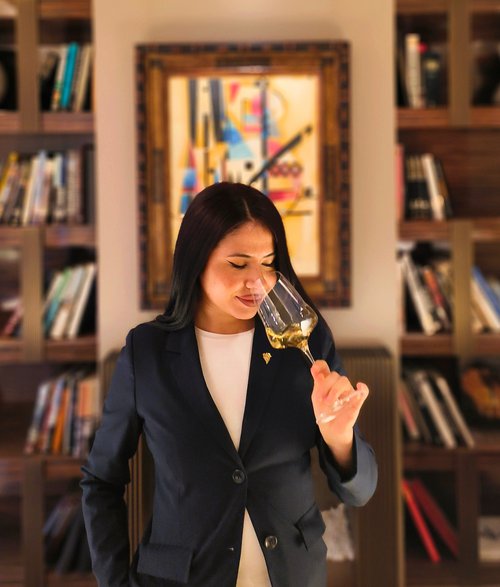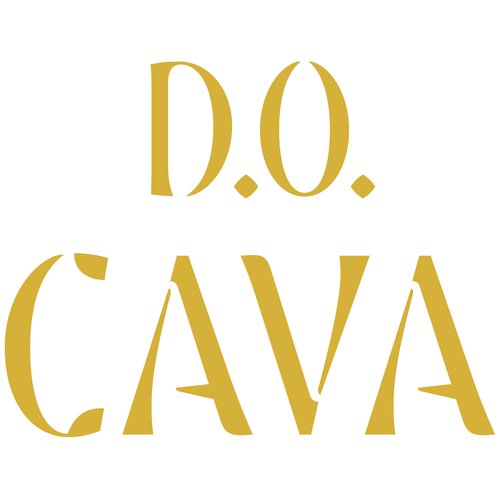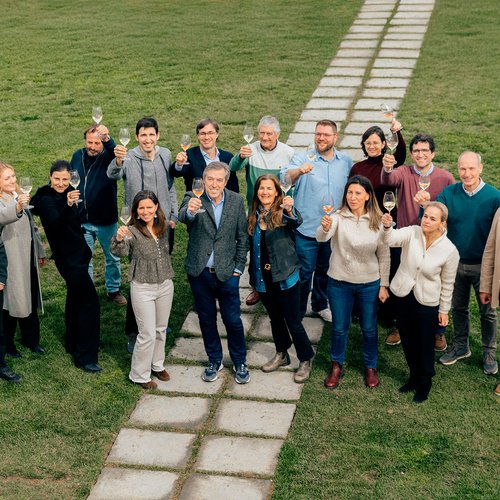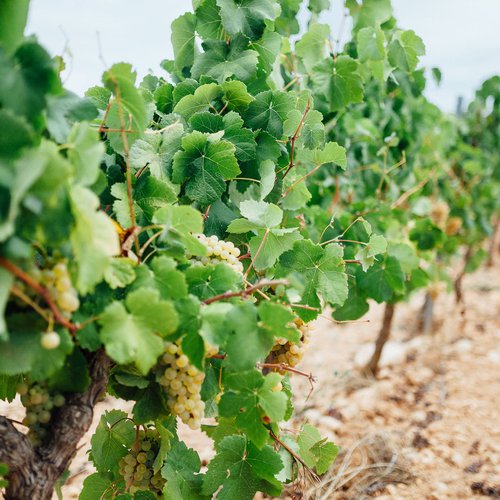“Cava Conversations” with Stephanie Kippes, Head Sommelier at ABaC Restaurant

"I saw the passion and clarity with which he explained the wine. It had never been presented to me in such depth, and I discovered, at the same time, the figure of the sommelier, which I didn’t know existed." Stephanie Kippes is today the Head Sommelier at ABaC, Jordi Cruz's three Michelin Star restaurant. A trip to Porto in 2017 stirred her curiosity about a world she had been unaware of until then. She studied Film and, at the same time, worked as a waitress and bartender. She was also studying for the WSET 3 Diploma (wine industry qualification) and, after five years of combining two arts, Wine and Cinema, came the crucial moment of having to choose between these crafts. "I couldn't divide my energies anymore, by then I was already at ABaC, cinema was more unstable, I was looking for a purpose in life, and when I focused my energies here, things happened, besides the pandemic," she says with a big smile. She is a sensitive and extremely attentive sommelier, generous in her dialogue and with sincere gestures that exude warmth, embracing the diner. She grew up in Galicia, although she was born in Bolivia, and today she lives in Barcelona. She adores and intelligently prescribes the value and history of each wine. One of her weaknesses is sparkling wines: "I love Cava. I assign it a lot of importance on the ABaC wine list, but also at home." Kippes likes to clarify the nuances of their oenological breadth: "There are long-aged ones…fresh, fruity, creamy...” She goes on to emphatically affirm that they are capable of accompanying a menu, from appetizer to dessert.
Just when you commit to wine, along comes the pandemic...
It was hard. I hesitated. I thought I was making a mistake, but I quickly realized that when you focus all your energy on one area, things happen. Wine is an art that brings everything together. There are winemakers who are music lovers, plots of land that have artistic names, wines inspired by cinema, by a song... I’m very emotional and I attach a lot of importance to the senses. In the cinema I learned to listen to myself, to work with the body and emotions. I try to give my all as a sommelier, and when you do something with love, it shows. At a three Michelin Star restaurant that never closes, you can never get everything right, but you always have to keep going and, in the end, everything works out.
What’s it like to be a sommelier at ABaC?
We have 2,500 wines on the list. And it’s not only about service and protocol, but also the pairings, mastery of different languages, managing the wine cellar... I always say that it’s important to be mentally prepared, it’s not a place for everyone. There are those who drop out along the way. It’s essential to be clear about your purpose, your goal, and to know that where you are is taking you there. You cry, you get stressed out, you laugh, you fall in love... You spend half your life in here. And there are certainly a lot of things that we romanticize. We see the beautiful things, but overlook the hard stuff, at the vineyards and in the fields. A sommelier has to cope with and hide their tension, when it’s there.
What is the customer's relationship with the wine list?
The maître d' conveys to them the gastronomic experience, the wine pairings by the glass and also serves the wine list. There are those who read it for half an hour, and then we sense that what we’re going to serve them is going to be interesting. There are some customers who really know their stuff. At first they can be daunting and intimidating, but in the end you have to be able to compose yourself and gain confidence. This is done by studying. I’ve even been asked the number of hectares of a Grand Cru plot. They put you to the test. This is why the sommelier must always be growing professionally: tasting, reviewing content, looking for different approaches to pairings. Passion is important, but the depth of one’s arguments also is. There are customers who are spending a lot of money, and you have to have a lot of respect for them; transmit warmth and caring, and smile... so that they will always remember the experience.
In terms of wine styles, what can we find at ABaC?
Sparkling wines, of course, with the Cava D.O. We give some historical and New World regions the importance they deserve. There are many single bottles from small wineries. The menu is created with an open mind. Wine changes all the time, and we have to show what the winemaker is doing at each given time.
How is Cava put forth at a three Michelin Star restaurant?
I love it, and I assign it a lot of importance on the ABaC menu. There are long-aged ones… fresh, fruity, creamy. They’re versatile and encompass everything from the appetizer to dessert. We like to surprise customers, so a customer might discover a 2006 Cava that could be wonderful today. We show them their aging capacity, how their quality grows with evolution. They are often swayed and go along.
It is, therefore, present on the ABaC wine pairing menu.
Always. It’s an opportunity to share the history of Cava, the creation of Brut Bature, who the pioneers of the D.O. were, who created it, the link with France and the importation of the champanoise method. I don't like to compare cava and champagne because they’re totally different; it's like if they make you choose between Verdejo or Sauvignon Blanc.
With your “pedagogical efforts” at the restaurant, is the old idea that Cava is only for celebrating fading away?
Fewer and fewer people ask for it as a dessert. We always serve it as an aperitif, but it’s not relegated to special occasions. Cava is also present in my day-to-day life, especially when I discover special ones. I like to open bottles and explore different styles and vintages.
At ABaC a high percentage of diners are foreigners. Do they value the quality of Spanish wine?
For local customers, we suggest travelling the world through wine, because our cellar features some spectacular value and they can travel from Barcelona to many of the country’s wine-growing regions. To those from abroad, we show them the potential we have here. Sometimes we play on their international tastes and show them something from here, with a lot of history but with a different style. At ABaC there are customers who come mainly to drink well, so we slow down and let them enjoy the wine and conversation with the sommelier. I’ve often been told to open whatever you want, I’m in your hands, I don't want a pairing...
What interplay is established between the wine list and the gastronomic menu?
Our menu is avant-garde, but with a classic touch. In Jordi Cruz's cuisine there are always Catalonian roots, but also Latin American and Asian flavors, without sacrificing our identity. Here there are the ingredients, that is our foundation, which combines very well with the wines we propose. We are constantly updating the wine list. I’ve never set a limit. Today I can say that it is mine, although it is also the sum of the interests of the different Head Sommeliers who preceded me. There is freedom of choice and that is a tremendous plus for a sommelier. I’m very grateful that they trust me so much. We have interesting and unique wines that add value to our restaurant, but they also give the winemakers opportunities for exposure at an important restaurant where we like to play with textures, tastes and flavors.
It must be a great responsibility to have the winemaker at the table.
They’re usually very grateful that we have their wines here, and that we not only focus on new releases, but also on their older vintages. Some ask for their wines, while others follow my guidance. Beautiful connections are established and they can see how we handle their products with the utmost respect, because behind everything, as sommeliers we know that there is effort, investment, patience, money and time.
They also see how you convey it...
Exactly. Besides, I always insist that a wine is never bad; you can just like it, or not. And you have to educate the customer, because they ask based on their tastes, but we are there to propose different things and, especially, to create harmonies with a dish, even if they are initially skeptical. There are wines of all styles and for every kind of customer, you just have to be open to discovering them.
What should the sommelier of the 21st century be like?
I believe that, in general, what is important in the restaurant business, and not just for sommeliers, is attitude and a lot of passion, because during the tough times, which come, along with wonderful ones, passion is what pushes you forward. And to have personality when communicating. One needs to listen and transmit and explain the wine in their own way, but one that reaches the customer and that is coherent. In short, attitude, a lot of personality, passion, and humility.





